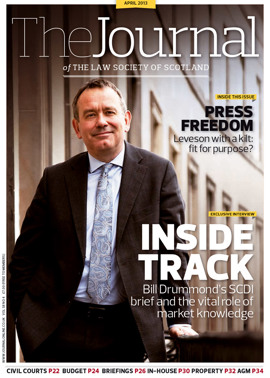President's column
Hello from Cape Town. I am here with colleagues at the 2013 Commonwealth Law Conference being held here in South Africa.
A key part of the duties of the President of the Law Society of Scotland is to look away from Scotland itself. Having been all these years a suburban general practitioner, suddenly to be flying all over the globe representing the profession has been quite a sea-change (or mainly air-change). Wish I had thought to collect the air miles.
It becomes clear very quickly that Scotland punches above its weight as a country and a legal system/profession. I don’t say that as any kind of independence hint or argument, but it is a simple fact that being Scottish has enormous currency and kudos in places like the USA, throughout the Commonwealth and even South East Asia, and it has been a privilege as much as a pleasure to champion our profession in a number of foreign lands.
The year’s geographical furniture includes, as well as Malawi, Brussels, Vancouver, Milan, Killarney and Belfast, attending the American Bar Association (in Chicago last summer) – a gigantic convocation of attorneys who, though like us in dress and language, often have a radically different approach to jurisprudence and certainly to the practice of the law. As I have alluded to before in this page, US lawyers seem to be natural business folk and quick to embrace technological change if they see a buck in it. It sits slightly oddly with this, though, that they shun and decry the idea of alternative business structures, which whatever else they represent in the opinion of solicitors and others, do provide a wider platform for the delivery of legal services, and some pretty heavy-duty opportunities to provide service at high efficiency and keen cost.
Contrast that with the International Bar Association conference, in Dublin last autumn. In the many sessions led by lawyers from all continents, new ways of working and providing legal representation and constitution were readily considered and debated. Again at the CCBE conference in Vienna, it is clear that many European legal systems and professions are being extremely creative in their methodology, not least the Czechs, who are in the process of creating an IT-driven unitary system for standardising and harmonising court practice throughout their nation.
BEHIND SCHEDULE
Coming closer to home, though still abroad for legal purposes, our friends in England & Wales have thoroughly embraced ABS. They already have over 150 registered providers of legal services in their new regime (out of as many as 500 applications), and the variety of provision is wide – this in turn will drive innovation in the traditional solicitor service and will be good for lawyers and clients alike.
Sadly, we in Scotland are now behind the pace. Whilst my colleagues within the Society have worked skilfully, quickly and responsibly in constructing a system for registration and regulating legal service providers, things are moving frustratingly slowly with the Scottish Government, and previously agreed points and principles are now being looked at afresh for no other apparent reason than the personnel have changed and continuity has been lost, or sacrificed. As such, while we had hoped to have our application to be approved as an ABS regulator granted by now, we have been asked to go back and redo aspects of our scheme, without a clear statement of what is wanted.
This is frustrating for the Society and for those firms and organisations who want to get going with provision of services in a new and modern way, and does not help our reputation abroad. At our Council dinner last month our guest speaker was my old friend Des Hudson, who is chief executive of the Law Society of England & Wales. The LSEW has plenty of challenges itself, and often casts envious glances towards us, for example to our Master Policy for professional indemnity, but it is already over a year into its ABS regime. We hope to be up and running this year, but… I appreciate that the ABS new world has to be right, and there are plenty of plates to be spun simultaneously on the ends of sticks. But the caution and inertia we are experiencing look to the country and the world like paralysis, and if we do want Scotland to be at the cutting edge of the legal world, we need to be allowed to get moving, and soon.
To finish on a brighter note, part of our team’s job here in South Africa is to begin the preparations for the 2015 Commonwealth Law Conference, awarded to Glasgow. I and my team (including and especially former President Jamie Millar, our Council member on the Commonwealth Law Association) are busy doing our international sales rep jobs. There is huge goodwill and enthusiasm already, and we look forward to Scotland being showcased internationally.
In this issue
- Fifty shades of lay?
- Employee owners: a view from across the Pond
- All change
- EIAs: increasing the impact
- Mooting comes to Strasbourg
- Reading for pleasure
- Opinion column: Elaine Sutherland
- Book reviews
- Profile
- President's column
- Minimise the risk of rejection
- Helping with enquiries
- Path to growth
- New starts for all?
- Leveson: alarm bells
- McLeveson: still in balance
- From Gill to Bill
- A Budget for aspiration?
- Too far removed?
- Enough to send you to sleep
- Interest on damages: what rate?
- Scottish Solicitors' Discipline Tribunal
- Let's get personal
- Good hedges make good neighbours
- Sep rep: on to the rules
- Ask Ash
- Change management for lobsters
- How not to win business: a guide for professionals
- Keeping errors in check: 2
- Wills at a distance
- Law reform roundup
- Make the survey count






